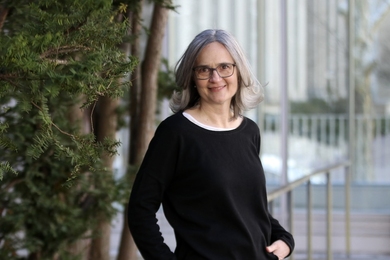MIT's proposed FY 93 budget shows continued commitment to major academic programs and to faculty recruitment initiatives among women and minority group members despite a recurring, but smaller, deficit and fiscal pressure in several "risk" areas including indirect research costs and sharply higher legal expenses.
That overview of the proposed $1.12 billion operating budget, which will be presented to the Executive Committee of the MIT Corporation May 1, was provided by Provost Mark S. Wrighton at the April 15 faculty meeting.
Despite continued budget pressure and continued reliance on unrestricted gifts to narrow the gap between income and expenses, Professor Wrighton said he expects that the Institute "will maintain excellence" and in a few areas be able to sow "the seeds for enhanced activity, if not enhanced excellence."
The Institute remains committed to providing funds for increasing diversity in faculty hiring, "programs to which we are unalterably committed," Professor Wrighton said. MIT is also committed to supporting the computing environment developed during Project Athena's life as an experiment, and to supporting the new biology requirement for first-year students, the provost said.
He said that programs for increasing the number of women and minority group members on the faculty have resulted in commitments to a number of appointments to women in addition to several offers pending. Efforts to recruit minority faculty have resulted in fewer commitments, but there are some offers outstanding.
Among the FY 92 "risk" areas listed by the provost were less tuition revenue than expected ($1.6 million), a decline in ILP revenue ($500,000), sharply higher legal expenses ($1.4 million) and a reduction in indirect cost recovery ($1.9 million).
The lower tuition revenue for the 1992-93 is a consequence of fewer transfer students coming and fewer students staying at the Institute, he said. ILP revenue is down because of the sluggish economy. Legal expenses are unexpectedly higher largely because of the cost of defending against the Justice Department's antitrust suit regarding MIT's financial aid and need-blind admissions policies. (See related story on Page 1.)
Constraints on the FY 93 revenue side, he said, include a lower tuition increase, which in turns links to a "salary plan far more modest than has been the case in recent years."
On the positive side, he said, is the successful Campaign for the future.
"We're nearing completion and as of yesterday afternoon (April 14) we were close to the $665 million mark. Noting that a more complete report on the campaign will be available in the future, Professor Wrighton noted that there has been a significant increase in endowment and that about $100 million has been committed to endow faculty professorships. In addition, endowment for financial aid for both graduate and undergraduate students has been increased and several interdisciplinary programs have been made possible.
He praised the faculty for its participation in campaign events and solicitations.
Summing up, Professor Wrighton said the FY 93 budget would have a lower projected deficit, require continued restraint and reliance on unrestricted gifts, but allow continued support for diversity in faculty hiring, the "hardening" of faculty salaries, renewal of the computing environment, the biology requirement and "a few new initiatives."
The bottom line, he said, will be "excellence maintained."
In other business, the faculty formally received the report of the Committee on Academic Responsibility, headed by Professor Sheila E. Widnall, associate provost, and heard a report on student academic integrity from Professor Nelson Y.S. Kiang, chair of the Committee on Discipline.
President Charles M. Vest underscored the recommendations of the Widnall committee dealing with the need to maintain continual discourse "across the faculty to renew our commitment to the basic values of integrity that really has to underlie all that we do."
Professor Kiang outlined a "proactive" approach being taken by the Committee on Discipline in dealing with student cheating, which he defined as "claiming credit for work not done." The goal, he said, is to reduce the level of cheating, not just deal with cases brought to the COD.
In addition to sending letters to all 10,000 students on the importance of academic integrity, and several follow up meetings, Professor Kiang said the COD and the Office of the Dean for Undergraduate Education and Student Affairs will collaborate on a colloquium in the fall on academic integrity. A date of October 21 has been set.
Professor Kiang said the major conclusion is that student cheating is deeply rooted in the present student culture. No simple solution is possible, he said, but increasing mechanisms for student-faculty-administration interaction is a place to begin and may lead "to something like an honor code."
A version of this article appeared in the April 29, 1992 issue of MIT Tech Talk (Volume 36, Number 28).





